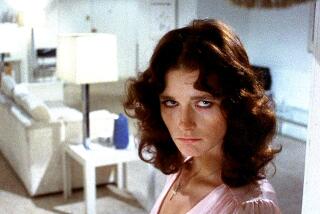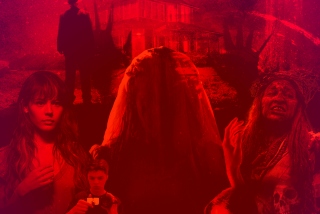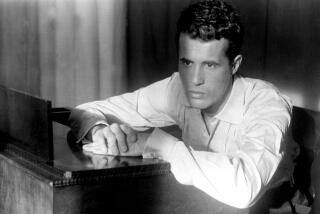Experiencing Argento, in stages
- Share via
The ITALIAN horror maestro Dario Argento is a long way from the glorious first decade or so of his career, when he seemed continually to be expanding the possibilities and ignoring the rules of the genre. His movies since the mid-’80s have seldom matched the giddy thrills of his ‘70s work, but as Anchor Bay’s new Dario Argento boxed set confirms, even at its most threadbare, his extravagant brand of Euro-schlock is rarely dull.
In his advancing years (he’s now in his late 60s), Argento has been more inclined to indulge cliches than invert them. But while his films have grown more conventional, they can still be counted on for moments of unexpected transcendence. Like so many aging auteurs, he is not immune to self-parody, but he has never quite lost his knack for gory tableaux -- his spasms of violence still have the ability to shock, not least in their outrageous beauty.
The new collection brings together five films from various stages of Argento’s career: “Tenebre” (1982) and “Phenomena” (1985), which roughly mark the end of his peak period; “Trauma” (1993), his first collaboration with his then-teenage daughter Asia; and “The Card Player” (2004) and “Do You Like Hitchcock?” (2005), two representatives of his less-than-illustrious current phase.
Argento began his career as a film critic for a Rome daily newspaper and got his start in movies as a screenwriter. (Along with another up-and-comer, Bernardo Bertolucci, he contributed the original story for 1968’s “Once Upon a Time in the West,” the international hit by fellow genre revisionist Sergio Leone.) His first directorial effort, “The Bird With the Crystal Plumage” (1970), is a cornerstone of the “giallo” genre of lurid, kinky murder mysteries -- named for the pulp paperbacks that inspired many of the films, and popularized by Argento and his countrymen Mario Bava and Lucio Fulci.
“Tenebre,” the best film in the set, is top-rank Argento: a shape-shifting whodunit in which an American novelist (Anthony Franciosa) heads to Rome for a publicity tour and finds the city in the grip of a serial killer who happens to be a fan. The murder sequences, especially one that involves a long, elaborate crane shot that prowls the outside of an apartment building, are so baroquely stylized as to be spellbinding. There are also intriguing pangs of self-consciousness. The author is put on the spot for his misogyny, an obvious nod to charges against Argento (who once famously said that he prefers to see beautiful women being killed on screen).
Supernatural thriller
In THE deeply dopey supernatural thriller “Phenomena,” the teenage heroine (15-year-old Jennifer Connelly), newly arrived at a Swiss boarding school, battles the local homicidal maniac with the help of an entomologist (Donald Pleasence) and her own mysterious ability to communicate with insects. Most of the film is enjoyably silly; the opening set piece -- which ends with a severed head being tossed off a waterfall -- and the delirious, anything-goes conclusion are sensational.
“Trauma,” despite an unhinged Piper Laurie cameo, is a relatively sedate retread of familiar motifs (decapitation, insects) and Freudian psychology. “The Card Player,” a fairly perfunctory procedural drama, bogs down in a perversely undramatic premise: a pair of detectives must thwart a serial killer by engaging him in video poker.
In the context of Argento’s recent disappointments, then, the amusing trifle “Do You Like Hitchcock?” is practically a return to form. A geeky film student, like Jimmy Stewart in “Rear Window,” spends a lot of his time spying on a neighboring building (and one particularly attractive resident); a murder takes place that the cinephile hero believes is modeled on “Strangers on a Train.” The parade of Hitchcock references, more endearing than smug, help pass the time. But it’s no surprise that the filmmaker Argento seems to be trying hardest to emulate here is his younger self.
More to Read
Only good movies
Get the Indie Focus newsletter, Mark Olsen's weekly guide to the world of cinema.
You may occasionally receive promotional content from the Los Angeles Times.








